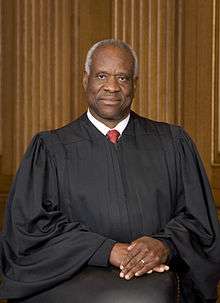| Type |
Case |
Citation |
Issues |
Joined by |
Other opinions |
| 2-01
|
NASA v. Nelson |
01562 U.S. 134 (2011)
|
background check of prospective federal employees • informational privacy • Privacy Act of 1974 |
|
|
|
| 2-02
|
Ortiz v. Jordan |
02562 U.S. 180 (2011)
|
Federal Rules of Civil Procedure • appealability of denial of summary judgment motion after trial on the merits • qualified immunity • post-trial judicial review of sufficiency of the evidence |
Scalia, Kennedy |
|
|
| 4-03
|
CSX Transportation, Inc. v. Alabama Dept. of Revenue |
03562 U.S. 277 (2011)
|
Railroad Revitalization and Regulatory Reform Act of 1976 • tax discrimination against rail carrier |
Ginsburg |
|
|
| 2-04
|
Williamson v. Mazda Motor of America, Inc. |
04562 U.S. 323 (2011)
|
National Traffic and Motor Vehicle Safety Act of 1966 • Federal Motor Vehicle Safety Standards on seat belt design • state law torts against auto manufacturers • federal preemption |
|
|
|
| 2-05
|
Michigan v. Bryant |
05562 U.S. 344 (2011)
|
Sixth Amendment • Confrontation Clause • hearsay exception for statements to help police address ongoing emergency |
|
|
|
| 4-06
|
Pepper v. United States |
06562 U.S. 476 (2011)
|
Federal Sentencing Guidelines • consideration of postsentencing rehabilitation |
|
|
|
| 4-07
|
Skinner v. Switzer |
07562 U.S. 521 (2011)
|
postconviction access to DNA testing • Section 1983 • Rooker–Feldman doctrine |
Kennedy, Alito |
|
|
| 4-08
|
Alderman v. United States • [full text] |
08562 U.S. 1163 (2011)
|
Commerce Clause • James Guelff and Chris McCurley Body Armor Act of 2002 |
Scalia (in part) |
|
| Thomas dissented from the Court's denial of certiorari, in a case involving whether a federal law against felons possessing body armor was constitutional after United States v. Lopez, 514 U.S. 549 (1995), which was the first Supreme Court case since the New Deal to set limits upon Congress's Commerce Clause power. The lower court's opinion held, on the basis of an older case, Scarborough v. United States, 431 U. S. 563 (1977), that the federal law was presumptively constitutional and that it was therefore not subject to the three-part test established in Lopez for analyzing whether a federal law exceeded Commerce Clause powers. In his dissent, Thomas complained that the Court, in its refusal to review the lower court's decision, "tacitly accepts the nullification of our recent Commerce Clause jurisprudence." |
| 1-09
|
Connick v. Thompson |
09563 U.S. 51 (2011)
|
single violation as basis for Section 1983 claim • failure to make Brady disclosure • failure to train prosecutors |
Roberts, Scalia, Kennedy, Alito |
|
|
| 1-10
|
Cullen v. Pinholster |
10563 U.S. 170 (2011)
|
Antiterrorism and Effective Death Penalty Act of 1996 • introduction of new evidence in habeas corpus proceedings • Sixth Amendment • ineffective assistance of counsel |
Roberts, Scalia, Kennedy; Ginsburg, Breyer, Alito, Kagan |
|
|
| 1-11
|
Sossamon v. Texas |
11563 U.S. 277 (2011)
|
prisoners' rights • Religious Land Use and Institutionalized Persons Act • Spending Clause • sovereign immunity |
Roberts, Scalia, Kennedy, Ginsburg, Alito |
|
|
| 2-12
|
AT&T Mobility LLC v. Concepcion |
12563 U.S. 333 (2011)
|
Federal Arbitration Act • federal preemption • class actions |
|
|
|
| 1-13
|
Montana v. Wyoming |
13563 U.S. 368 (2011)
|
Yellowstone River Compact • water law • change in irrigation methods reducing downstream flow • doctrine of appropriation • doctrine of recapture |
Roberts, Kennedy, Ginsburg, Breyer, Alito, Sotomayor |
|
|
| 1-14
|
Schindler Elevator Corp. v. United States ex rel. Kirk |
14563 U.S. 401 (2011)
|
False Claims Act • bar on qui tam suits based on public disclosures • Freedom of Information Act responses |
Roberts, Scalia, Kennedy, Alito |
|
|
| 1-15
|
McNeill v. United States |
15563 U.S. 816 (2011)
|
Armed Career Criminal Act • sentencing enhancement for prior serious drug offense convictions |
Unanimous |
|
|
| 2-16
|
Sykes v. United States |
16564 U.S. 1 (2011)
|
Armed Career Criminal Act • felony vehicle flight as predicate offense under residual clause |
|
|
|
| 1-17
|
Talk America, Inc. v. Michigan Bell Telephone Co. |
17564 U.S. 50 (2011)
|
Telecommunications Act of 1996 • incumbent local exchange carrier interconnection duty • entrance facility as part of network |
Roberts, Scalia, Kennedy, Ginsburg, Breyer, Alito, Sotomayor |
|
|
| 2-18
|
Microsoft Corp. v. i4i Ltd. Partnership |
18564 U.S. 91 (2011)
|
Patent Act of 1952 • presumption of patent validity • on-sale bar • clear and convincing evidence |
|
|
|
| 1-19
|
Janus Capital Group, Inc. v. First Derivative Traders |
19564 U.S. 135 (2011)
|
SEC Rule 10b-5 • participation of corporate affiliate in making false statements |
Roberts, Scalia, Kennedy, Alito |
|
|
| 2-20
|
Borough of Duryea v. Guarnieri |
20564 U.S. 379 (2011)
|
employer retaliation • First Amendment • public employee speech • Petition Clause |
|
|
|
| 4-21
|
Turner v. Rogers |
21564 U.S. 431 (2011)
|
Due Process Clause • right to counsel in civil contempt hearing for indigent defendant facing incarceration |
Scalia; Roberts, Alito (in part) |
|
|
| 1-22
|
PLIVA, Inc. v. Mensing |
22564 U.S. 604 (2011)
|
federal generic drug labeling requirements • federal preemption |
Roberts, Scalia, Alito; Kennedy (part) |
|
|
| 4-23
|
Brown v. Entertainment Merchants Assn. |
23564 U.S. 786 (2011)
|
First Amendment • freedom of speech • restriction on sale of violent video games to minors |
|
|
|
